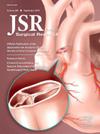Colorectal Surgery Outcomes and Healthcare Burden for Medicare Beneficiaries With Dementia
IF 1.7
3区 医学
Q2 SURGERY
引用次数: 0
Abstract
Introduction
Patients with Alzheimer's disease and related dementias (ADRD) undergoing colorectal surgery have suboptimal postoperative outcomes, but the specific adverse outcomes and the context of these worse outcomes on a national level are not well understood.
Methods
Colorectal surgery patients with and without ADRD from January 1, 2017, to October 1, 2018, were identified using traditional, fee-for-service Medicare claims data. Unadjusted and adjusted analyses were performed to evaluate postoperative outcomes.
Results
123,324 Medicare beneficiaries (mean age 76.5, 59.3% female) underwent colorectal surgery in the study cohort with 8.3% (n = 10,254) having a preoperative diagnosis of ADRD. Colorectal surgery patients with ADRD were older (81 versus 76 y old, P < 0.001), frail (42.8% versus 13.6%, P < 0.001), and had more comorbidities (Elixhauser Score 19.6 versus 13.9, P < 0.001) compared with those without an ADRD diagnosis. Patients with ADRD more often had open surgery (75.2% versus 65.7%, P < 0.001) and emergency surgery (65.1% versus 37.8%, P < 0.001). Unadjusted and adjusted analyses demonstrated that patients with ADRD have an increased risk of in-hospital, 30-d, and 90-day mortality, as well as postoperative complications. Patients with ADRD required more healthcare resources after colorectal surgery including increased length of stay (7 versus 5 days), discharge to a higher level of care (60.8% versus 25.8%, P < 0.001), and discharge to a facility (54.0% versus 23.8%, P < 0.001).
Conclusions
For patients undergoing colorectal surgery, the diagnosis of ADRD is an independent risk factor for adverse postoperative outcomes and results in increased healthcare resource utilization both in hospital and after discharge.
老年痴呆患者的结直肠手术结果和医疗负担
导语:接受结直肠手术的阿尔茨海默病及相关痴呆(ADRD)患者的术后预后不理想,但具体的不良结果以及这些不良结果在全国范围内的背景尚不清楚。方法选取2017年1月1日至2018年10月1日伴有和不伴有ADRD的结肠直肠手术患者,使用传统的按服务收费的医疗保险索赔数据进行识别。进行未调整和调整分析以评估术后结果。研究队列中有123,324名医疗保险受益人(平均年龄76.5岁,59.3%为女性)接受了结直肠手术,其中8.3% (n = 10,254)术前诊断为ADRD。结直肠手术合并ADRD的患者年龄较大(81岁vs 76岁,P <;0.001),虚弱(42.8%对13.6%,P <;0.001),并且有更多的合并症(Elixhauser评分19.6比13.9,P <;0.001),与未诊断为ADRD的患者相比。ADRD患者更常接受开放手术(75.2% vs 65.7%, P <;0.001)和急诊手术(65.1%对37.8%,P <;0.001)。未经调整和调整的分析表明,ADRD患者的住院、30天和90天死亡率以及术后并发症的风险增加。ADRD患者在结直肠手术后需要更多的医疗资源,包括住院时间延长(7天对5天),出院后护理水平更高(60.8%对25.8%,P <;0.001),以及排放到设施(54.0%对23.8%,P <;0.001)。结论对于接受结直肠手术的患者,ADRD的诊断是术后不良结局的独立危险因素,并导致住院和出院后医疗资源利用率的增加。
本文章由计算机程序翻译,如有差异,请以英文原文为准。
求助全文
约1分钟内获得全文
求助全文
来源期刊
CiteScore
3.90
自引率
4.50%
发文量
627
审稿时长
138 days
期刊介绍:
The Journal of Surgical Research: Clinical and Laboratory Investigation publishes original articles concerned with clinical and laboratory investigations relevant to surgical practice and teaching. The journal emphasizes reports of clinical investigations or fundamental research bearing directly on surgical management that will be of general interest to a broad range of surgeons and surgical researchers. The articles presented need not have been the products of surgeons or of surgical laboratories.
The Journal of Surgical Research also features review articles and special articles relating to educational, research, or social issues of interest to the academic surgical community.

 求助内容:
求助内容: 应助结果提醒方式:
应助结果提醒方式:


